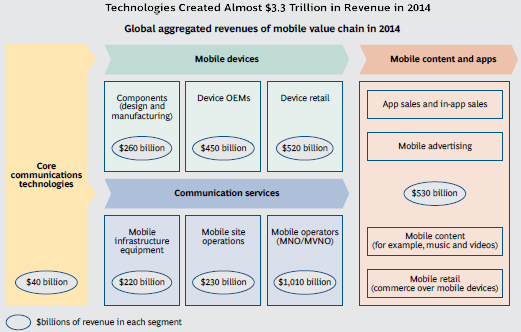Mobile Technologies are a critical driver of the world economy, generating global revenue of almost $3 trillion. The mobile revolution has accelerated innovation worldwide, boosting global GDP and creating new jobs across a vast array of industries. Mobile is directly responsible for 11 million jobs worldwide, and the indirect impact far exceeds this number. More than two-thirds of mobile industry jobs are high-value, knowledge-economy jobs, such as innovation research, component and device design, and app development.

The mobile value chain extends across continents, bringing with it a boost to national economies around the world. A smartphone sold in Germany by a South Korean vendor, for example, involves coordination among many economies. The technology inside this smartphone is likely developed among the U.S., several European Union (EU) countries, South Korea, and China. Components are likely produced in some combination of the U.S., South Korea, Japan, and Taiwan, and assembled in China.
The mobile revolution has generated enormous investments in R&D and infrastructure worldwide. Mobile communications infrastructure is one of the only infrastructures that relies almost solely on private investment (unlike, for example, bridges, roads, airports etc)
South Korea, the U.S., and China are among those nations with the largest mobile contributions to GDP. Net exports (the difference in value between exports and imports for a given country) have had a dramatic impact on mGDP in certain countries.
South Korea has quickly become the world’s most advanced mobile economy, having embraced 3G and 4G since their onset. Mobile represents 11 percent of the country’s GDP, valued at $143 billion. South Korea is a leading actor across all phases of the mobile value chain, particularly in its high-value segments such as design and production of devices and components. A strong focus on R&D and bold investments in nascent technologies, such as semiconductors in the 1980s and Code Division Multiple Access (CDMA) two decades later, helped South Korean players take the lead in design and manufacturing operations.
The U.S. is a major contributor to core segments of the mobile value chain, with companies like Qualcomm innovating in core communications technologies, Apple leading in OEM, Google with the most widely used smartphone operating system (Android), and Facebook as one of the most popular global apps. As a strong player in mobile innovation, the U.S. gained a leadership position in 4G technology. U.S. app developers have generated an array of new businesses.
In emerging markets, China has led the way in embracing mobile. With China’s wide deployment of 2G and 3G services, Chinese consumers have benefited from Mobile technologies. In 2012, China became the world’s largest smartphone market. Mobile represents 3.7 percent of China’s GDP, with a 17.7 percent compound annual growth rate from 2009
through 2014.
Mobile has been a driving force in the success of some of the world’s most valuable companies: 6 of the 25 most valuable companies in the world are participants in the mobile value chain Apple, Google, China Mobile, Alibaba, Facebook, and Verizon. Mobile is also driving intense innovation in the start-up community as well—7.9 percent ($37 billion) of all venture capital (VC) funding in 2014 was invested in mobile start-ups, up from 3.8 percent in 2010.
While the World Innovated and Moved Ahead, India’s Sick Politicians from the Corrupt Congress architected a massive Telecom Spectrum Scam bringing to halt all the major reforms. Mobile value chain has generated enormous economic and social benefits for both developed and emerging markets. Join the mainstream progressive and innovative minds to get India in the Top league just like how Flipkart has been striving to do so.